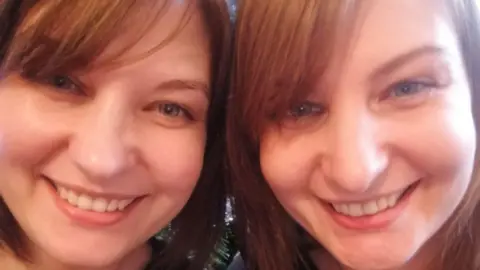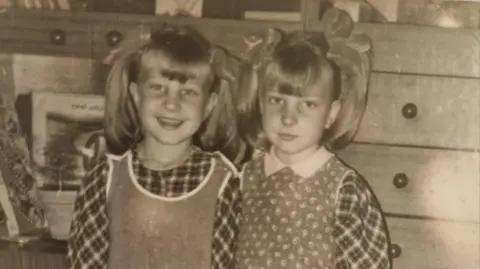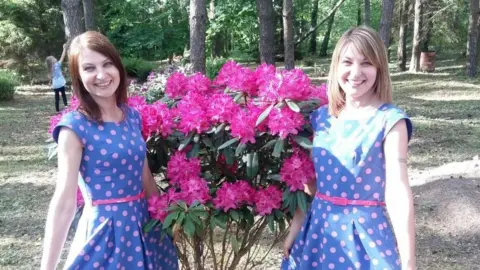
 Supplied
SuppliedThe twin sister of a woman who died after being found under a coat while waiting for hours at an overcrowded A&E department says she cannot accept what happened to her.
Mother of two Inga Rublite was discovered slumped on the floor of the Queen’s Medical Centre (QMC) in Nottingham on 20 January and died from a brain aneurysm two days later.
An inquest into Ms Rublite’s death, which concluded on 25 July, heard that while “opportunities were missed” to diagnose the 39-year-old, she still would have suffered a “devastating” second bleed on the brain, which caused her death.
Inese Briede said questions around her sister’s death remained unanswered and said she would continue to “fight” for her.
Ms Briede, who travelled to the inquest from her home in Latvia, said although it was the outcome she expected, she could not accept it.
Speaking from Latvia, she told the BBC: “I think my family was thinking they would get some answers and that the anger and everything would go away – but no.
“We feel very let down by the system. I believe I’ve got more questions than before the inquest.”
Nottingham Coroner’s Court heard that on 19 January, Ms Rublite attended the emergency department, on the advice of the 111 service, after saying she was suffering with a severe headache, neck pain, nausea and blurred vision.
After she was triaged, staff failed to refer her for a CT [computed tomography] scan and later, following a second assessment when Ms Rublite reported severe pain, there was no escalation in her care.
These were considered two “missed opportunities” by the coroner, Elizabeth Didcock.
The inquest was told that on the night Ms Rublite attended hospital, the emergency department was overcrowded and understaffed.
‘Inga was unlucky’
Ms Didcock added she was “struck by a lack of repeated calling” if a person did not respond in the emergency department, adding she would have expected further calls 10 to 15 minutes after each missed callout.
Nottingham University Hospitals (NUH) NHS Trust said it was “truly sorry that [it] did not meet the standards [it] strives to deliver”, and that it had introduced changes in its emergency department.
NUH added a new screen to assist with calling patients forward was among the changes made.
Ms Briede told the BBC she “could not accept” how her sister was missed and felt the changes, while “thoughtful”, were “not enough”.
She added that during the inquest, it was suggested her sister could have been mistaken for a “homeless person”.
“It wasn’t just one on that day that it [A&E] was overcrowded. As I understand, the system had been working like that for a long time, Inga was just unlucky.
“I believe the hospital doesn’t really have the answer about what happened that night,” she said.
 Supplied
SuppliedMore than six months on from her sister’s death, Ms Briede said she had moments when she forgot Ms Rublite was gone.
“Inga was just this positive person. She had a very, very good sense of humour – she could laugh a lot,” Ms Briede said.
The pair moved to England together from Latvia – where they grew up with five other siblings – in September 2004, after finishing their education.
When Ms Briede moved back to Latvia four years later, while her sister decided to stay, she said it was the first time they had ever been separated, and it only lasted a few “difficult months” before she travelled back to Derby to visit Ms Rublite for Christmas.
The pair stayed close, Ms Briede said, keeping in touch daily via video calls.
She said: “We never argued – we thought the same way. Even on those video calls, we could just laugh.”
 Supplied
SuppliedMs Briede said the last video call the pair had together was the night Ms Rublite went into hospital, when she had complained of a bad headache.
After trying to reach her the next day, the next call Ms Briede made to her sister’s phone was answered by a nurse.
Ms Briede travelled to England in time to be at her sister’s bedside as her last breaths were taken.
She said: “When they turned off those machines, everything just went quiet. We’d cried for so many hours but at that moment, nobody cried.”
She was joined by Ms Rublite’s two sons, who she said were the best things that ever happened to her, describing her sister as a “proud mum”.
Ms Rublite had worked as a dispatcher at a warehouse and had been saving to get a house, her sister added.
“She worked so hard and anybody who knew Inga, the first thing that came to mind was always her smile. She never complained,” Ms Briede said.
She added: “Inga’s story is not over yet – not for our family.”



Be the first to comment